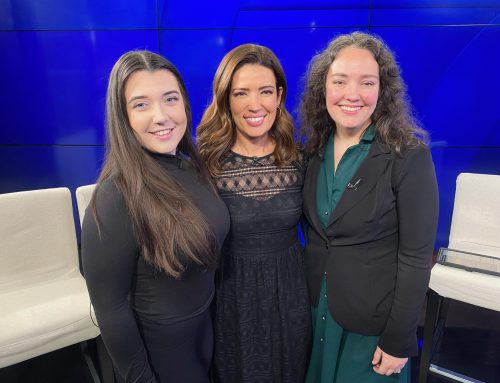
Dr. Karen Federici, owner of Family First Women & Children’s Healthcare, 2560 Hauser Ross Drive, Suite 425, in Sycamore, stands near the freezer of the new breast milk dispensary that will open May 11. (Katrina Milton)
SYCAMORE – When Gretchen Sprinkle of Cortland was pregnant with her son about 5 years ago, she learned about the process of donating and receiving breast milk.
After her son was born, she learned that she had an oversupply of breast milk and was producing more than her son would be able to drink.
She decided to donate her excess breast milk to Northwestern Medicine Kishwaukee Hospital’s Breastfeeding Center in DeKalb, where it is distributed through Mothers’ Milk Bank of the Western Great Lakes. She has continued to donate her excess milk after breastfeeding her other two children.
“It was such an easy process to get started, and I know of all the good that it can do,” Sprinkle said. “I drop off my excess breast milk every other month. It’s a great way to have tested, pasteurized milk available if breastfeeding is important to you.”
Family First Women & Children’s Healthcare in Sycamore has partnered with the Mothers’ Milk Bank of the Western Great Lakes to serve as a breast milk dispensary, where pasteurized donor breast milk can be purchased.
The dispensary will be located at Family First’s office at 2560 Hauser Ross Drive, Suite 425, in Sycamore.
A grand opening event, free and open to the public, will be held from 2:30 to 4 p.m. Wednesday, May 11, at Family First. Both organizations will be present to celebrate the new dispensary, introduce staff and share information. Snacks and light refreshments will be provided.
Amber Barnes, registered nurse and clinical manager of Mothers’ Milk Bank, said the partnership is a natural one.
“Our missions both aim to support the health and nutrition of women and children,” Barnes said in a news release announcing the partnership.
Dr. Karen Federici, owner of Family First, said that having a dispensary location in Sycamore will make much-needed breast milk more easily accessible. She said that there are no nearby in-person dispensary locations, with the closest being in Crystal Lake.
“There is definitely a need in the community,” Federici said. “There is always a high need for breast milk in the first few days after giving birth, and moms often need a little supplement.”
Northwestern Medicine Kishwaukee Hospital Breastfeeding Center in DeKalb has been a depot site for the milk bank since 2014, collecting milk donations from local mothers.
To donate breast milk, mothers must fill out a donor interest form online at www.milkbankwgl.org. The organization will reach out to schedule a 10-minute phone screening. If mothers are a candidate for donation, they will complete a donor application, which includes notes from their doctor and their baby’s pediatrician. The milk bank will arrange for blood testing at no cost to applicants.
Once approved, mothers will be given a donor number. When donating, mothers pump their breast milk, freeze it at home in provided bags, and drop it off frozen at the hospital’s depot. The milk is then tested, pasteurized and pooled before being distributed to dispensaries.
Donation requirements differ for mothers who donate after loss through a special bereavement program. For more information on the bereavement program, call 847-262-5134.
Up to 10 4-ounce bottles can be purchased at a time from the Family First dispensary without a prescription. Each 4-ounce bottle costs $20. For a larger need of breast milk, families can contact the milk bank and have the milk shipped directly to their home with possible insurance coverage. Appointments are not needed to stop by the dispensary, which will be open to the public.
The milk has a shelf life of up to a year in the freezer. Directions of how to store, thaw and feed your baby the milk is included with each purchase.
Federici said breastfeeding has health benefits for both mothers and babies.
“Breast milk helps decrease the risk of asthma, [Sudden Infant Death Syndrome], gastrointestinal issues, Type 1 diabetes and obesity in babies,” Federici said. “For mothers, breastfeeding improves their moods and lowers the risk of cardiovascular disease, Type 2 diabetes, breast and ovarian cancer and postpartum depression.”
Federici said that in addition to health benefits, breastfeeding is also more cost-effective.
“Baby formula can cost up to $2,000 per year,” Federici said. “There are also baby formula recalls and shortages throughout the country.”
Datasembly, which tracked baby formula stock at more than 11,000 stores, found that 40% to 50% of the top-selling baby formula products were out of stock at U.S. retailers as of the week ending April 24.
“Having access to breast milk can really help, especially in the first few days after giving birth,” Federici said. “Some babies are sensitive to baby formula, which is made from cow’s milk. Introducing your baby to formula changes the good bacteria in their gut. Using a donor’s milk can help protect their gut that way.”
As a mother herself, Federici said she wishes a breast milk dispensary was available when her children were babies.
“When my first baby was born, she wouldn’t latch on, and as a mom, I was worried about feeding her,” Federici said. “Now she’s going to be 26, and I still think about how worried I was. Fortunately, I was able to pump enough.”
“I think feeding their babies and keeping them healthy is something all parents worry about,” she said. “Families should know that help is available if needed.”
For more information about donating breast milk through Mothers’ Milk Bank of the Western Great Lakes, visit www.milkbankwgl.org.
For more information about Family First Women & Children’s Healthcare’s breast milk dispensary, visit www.familyfirstdocs.com or call 815-784-6300.




